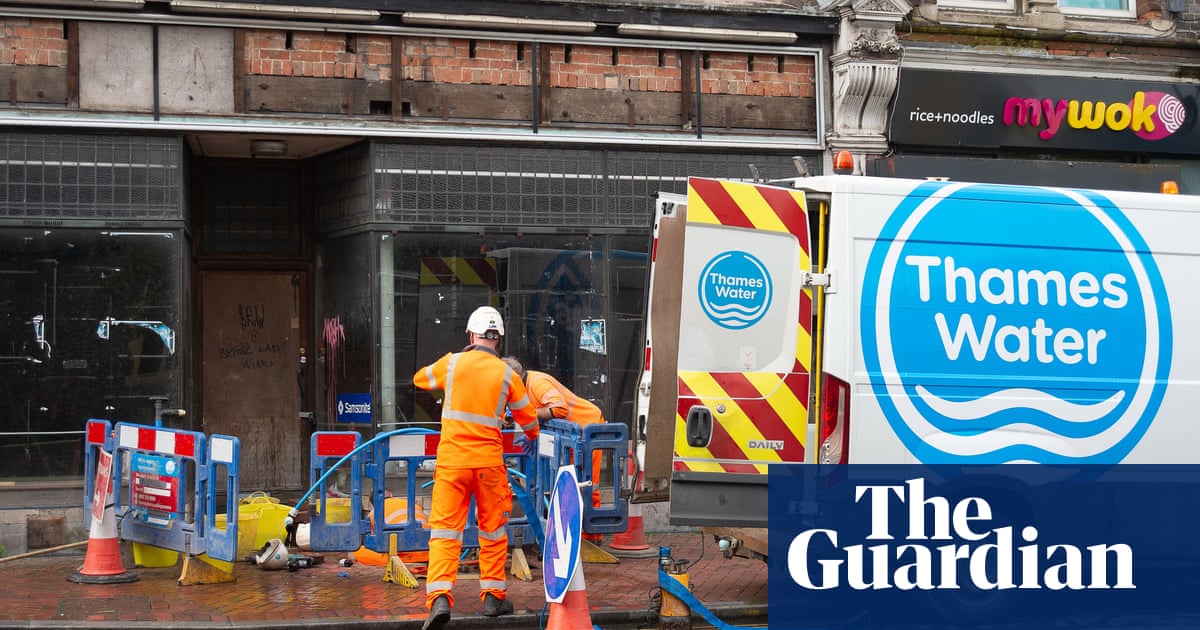Thames Water was hit with penalties of nearly £39m last year after missing a string of environmental targets and said its tumultuous corporate governance had damaged its reputation.
The debt-laden company – which was this week put into special measures by the regulator, Ofwat – missed 21 regulatory targets last financial year in multiple areas, from pollution incidents to leakage and supply interruptions, a report said.
Thames, which serves 16 million customers across London and the Thames valley, was hit with a £12m penalty after coming bottom among 17 companies ranked for customer service.
It said halting brand campaigns to focus on its turnaround had hit its scores, and “customer perception has also been influenced by negative media publicity this year, including the resignation of our CEO, company debt, operational issues, and pollution fines”.
The penalties emerged in the company’s annual performance report, which was belatedly released late on Wednesday night. The document was published a day after Thames Water warned that it would run out of cash by next June without fresh funds, and the night before Ofwat put it into the unprecedented “turnaround oversight regime”.
Britain’s biggest water supplier could be put into a government-handled administration and the bulk of its £15.2bn debt mountain added to the public purse if it cannot raise extra funds to invest in its ageing assets.
Although the new penalties will put further strain on the company’s balance sheet, they are unlikely to play a significant part in deciding its future, as it aims to raise £3.25bn in fresh equity.
Ofwat was accused of treating customers with “contempt” as it said bill payers in England and Wales would have to pay an extra £94 on average over five years as water companies attempt to fix sewage spills and leaks which have angered politicians and campaigners.
The regulator penalises and rewards English and Welsh water companies based on their performance against multiple targets over a year.
Thames’s largest penalty was £16.3m for water supply interruptions, caused in part by an outage in Guildford – blamed on Storm Ciarán – which left thousands in Surrey without water last year. “The weather has once again exposed the fragility of our assets,” Thames said in its report.
The company was hit with a £14m penalty for missing leakage targets, blamed in part on cold snaps in December and January; £12m for increasing pollution incidents; and £7m for poor performance in internal sewer flooding.
Overall, the £38.6m in total net penalties was down on £82.3m the year before, but above the £35m in 2021-22. Thames received financial rewards for progress in renewable energy production and reducing sewer collapses.
after newsletter promotion
Thames Water’s chief executive, Chris Weston, who joined the business in January, said its employees “remain focused on the delivery of our three-year turnaround plan”.
The company hopes to avoid nationalisation by raising money in the private markets. In its report, the chair, Sir Adrian Montague, said: “With the right team, time, money and resources, Chris and I both believe we can turn this business around – it would be in the best interest of customers and the environment for Thames Water to remain market-led.”
The new penalties come against the backdrop of a strained relationship between Ofwat and Thames. The regulator revealed on Thursday that members of the company’s board did not support elements of its own five-year business plan and called the costs “poorly justified”.
Thames Water also said it had to halt a £70m “green economic recovery” (GER) programme, agreed during the pandemic. The programme was designed to accelerate the rollout of smart meters, and the allowance was contingent on the company hitting leakage targets. However, it blamed a drought and “freeze-thaw events” for missing the targets.
Ofwat rejected a request to alter the targets. Thames said that decision meant “we were left with no alternative but to stop the GER programme”, and acknowledged that it would be a “disappointment” for customers.
The Guardian revealed last year that Thames had failed to install a single smart meter in the Thames valley under the programme, which was supposed to deliver 204,700 of the devices.

